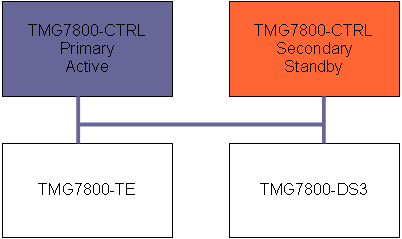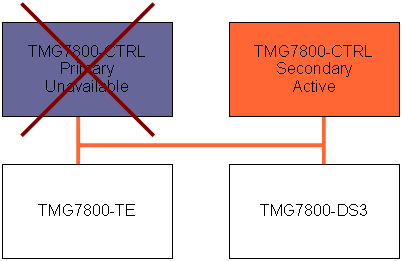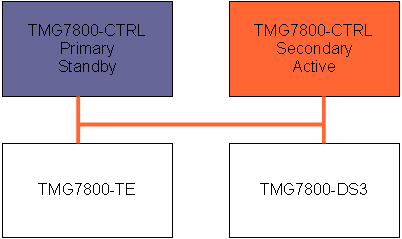Redundancy & High Availability:Hosts
(Creation) |
m (→Hard Disk: add wikipidia raid link) |
||
| (3 intermediate revisions by one user not shown) | |||
| Line 3: | Line 3: | ||
There are 3 features available for the [[TMG7800-CTRL]] | There are 3 features available for the [[TMG7800-CTRL]] | ||
| − | == TMG-CONTROL | + | == TMG-CONTROL == |
When dealing with a high capacity system, TelcoBridges recommends to use 2 [[TMG7800-CTRL]] units. The goal is to minimize down time in case of failure. When 2 [[TMG7800-CTRL]] units work in redundancy, 1 is considered as [[Active/Standby|Active]], the other [[Active/Standby|Standby]]. | When dealing with a high capacity system, TelcoBridges recommends to use 2 [[TMG7800-CTRL]] units. The goal is to minimize down time in case of failure. When 2 [[TMG7800-CTRL]] units work in redundancy, 1 is considered as [[Active/Standby|Active]], the other [[Active/Standby|Standby]]. | ||
Here is an example [[TMG7800-CTRL]] unit switchover: | Here is an example [[TMG7800-CTRL]] unit switchover: | ||
| + | |||
| + | Default Host redundancy setup where [[Primary/Secondary|Primary]] [[TMG7800-CTRL]] unit is [[Active/Standby|Active]] and [[Primary/Secondary|Secondary]] unit is [[Active/Standby|Standby]] | ||
| + | |||
| + | [[Image:Ha_Host_Redundancy.png|TMG7800-CTRL Redudancy Setup]] | ||
| + | |||
| + | |||
| + | In the eventuality where the [[Primary/Secondary|Primary]] unit fails, the [[Primary/Secondary|Secondary]] unit will take over management of the system. | ||
| + | |||
| + | [[Image:Ha_Host_Redundancy_Primary_Fail.png|TMG7800-CTRL Redudancy With Primary Failure]] | ||
| + | |||
| + | |||
| + | When the [[Primary/Secondary|Primary]] recovers, the [[Primary/Secondary|Secondary]] unit will remain the [[Active/Standby|Active]] unit | ||
| + | |||
| + | [[Image:Ha_Host_Redundancy_Primary_Recover.png|TMG7800-CTRL Redudancy With Primary Recovery]] | ||
| Line 15: | Line 29: | ||
Each of the [[TMG7800-CTRL]] contains dual AC or DC power supplies. For more details, see the [[Redundancy_%26_High_Availability:Power_Supply|power supplies]] page. | Each of the [[TMG7800-CTRL]] contains dual AC or DC power supplies. For more details, see the [[Redundancy_%26_High_Availability:Power_Supply|power supplies]] page. | ||
| − | == Hard Disk | + | == Hard Disk == |
| − | One of the most common failure for server are hard disk failure. Which is why all [[TMG7800-CTRL]] units are supplied with 2 hard disks setup in RAID1. It is important to mention that the hard disks are hot-swappable. | + | One of the most common failure for server are hard disk failure. Which is why all [[TMG7800-CTRL]] units are supplied with 2 hard disks setup in [http://en.wikipedia.org/wiki/RAID RAID1]. It is important to mention that the hard disks are hot-swappable. |
| − | + | *[[TMG:Replace_Hard_Disk|TMG7800-CTRL Hard Disk Replacement Procedure]] | |
Latest revision as of 09:59, 14 February 2011
The TMG7800 was designed for high-capacity, high-performance and high availability in mind.
There are 3 features available for the TMG7800-CTRL
TMG-CONTROL
When dealing with a high capacity system, TelcoBridges recommends to use 2 TMG7800-CTRL units. The goal is to minimize down time in case of failure. When 2 TMG7800-CTRL units work in redundancy, 1 is considered as Active, the other Standby.
Here is an example TMG7800-CTRL unit switchover:
Default Host redundancy setup where Primary TMG7800-CTRL unit is Active and Secondary unit is Standby
In the eventuality where the Primary unit fails, the Secondary unit will take over management of the system.
When the Primary recovers, the Secondary unit will remain the Active unit
Dual Power Supply
Each of the TMG7800-CTRL contains dual AC or DC power supplies. For more details, see the power supplies page.
Hard Disk
One of the most common failure for server are hard disk failure. Which is why all TMG7800-CTRL units are supplied with 2 hard disks setup in RAID1. It is important to mention that the hard disks are hot-swappable.


